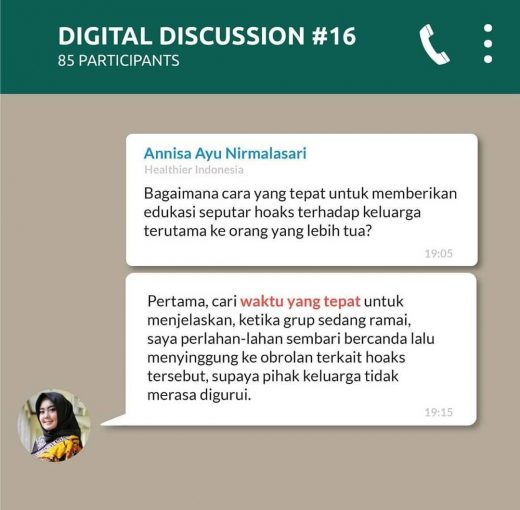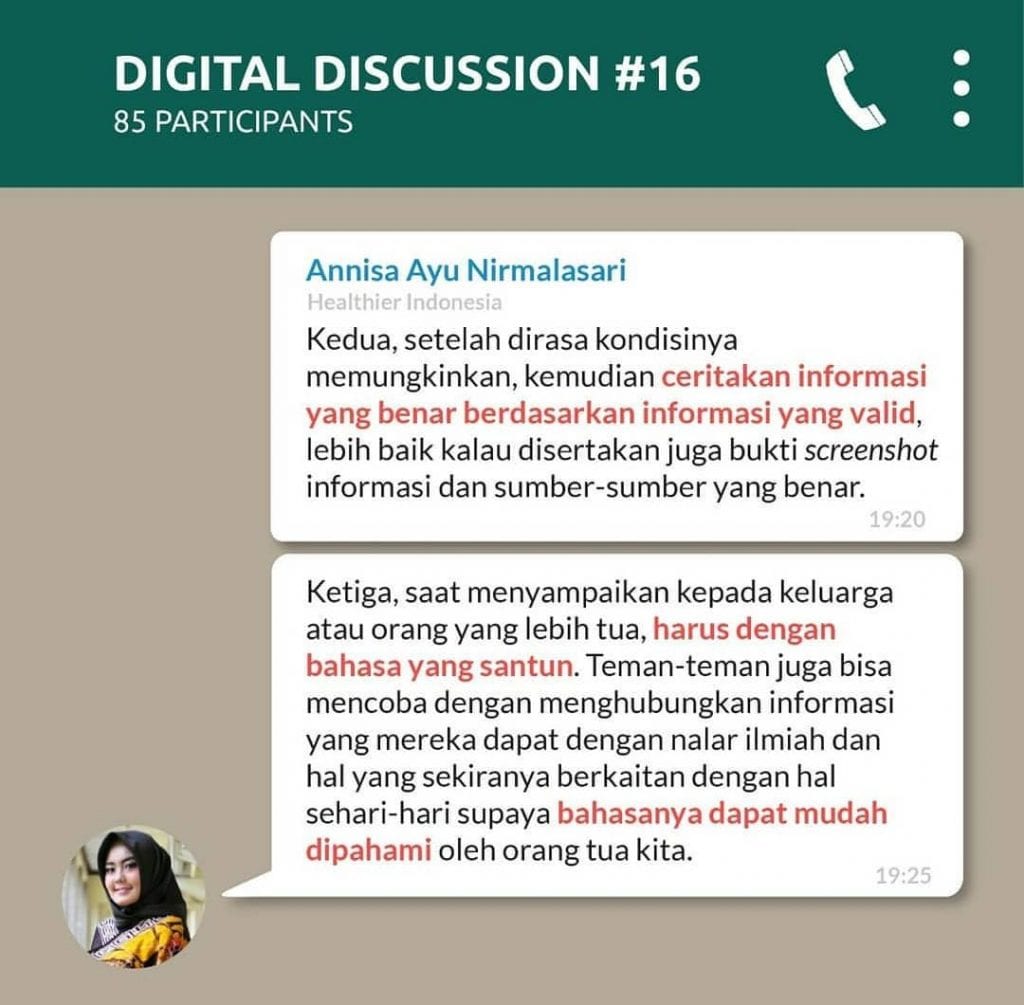
Yogyakarta, April 9th, 2020—COVID-19 pandemic is widely known as a problem throughout the world, including Indonesia. With the number of patients and deaths increasing, all parties are working together to inhibit the rate of spread of this virus. The rise of hoaxes amidst this crucial situation is inevitable. Along with the cause of panic in society, hoaxes also made people apply “health” tips that have not been scientifically proven. Hence, Center for Digital Society (CfDS) of Faculty of Social and Political Science UGM (Fisipol UGM) invited Smart People to recognize and fight the COVID-19 hoaxes in Digital Discussion #16: “Countering Hoax COVID-19”.
This discussion was moderated by Made Agus Bayu Sudharma or Mas Bayu as the event staff of CfDS. This time, the speaker in the discussion was Annisa Ayu Nirmalasari or Mbak Annisa from Healthier Indonesia. Healthier Indonesia itself is a research-and-advocacy-based community, partake in providing health information through print and electronic media. Healthier Indonesia also carries our health promotion through community service programs, aiming to educate the public regarding the management of health information and health-related decision making

As often happens, since half an hour before the discussion began, the moderator had reminded the participants that the discussion would start shortly. At exactly 19.00 WIB, the moderator began the discussion by introducing himself and announcing the rules of the discussion. After introducing the speaker of the discussion, Mas Bayu asked the participants about the COVID-19 hoaxes they had gotten so far. The answers varied, some participants received hoaxes related to prevention, spreading, and healing COVID-19. Mbak Annisa as the speaker responded to the questions from the participants by explaining hoax in general how to identify it.
A hoax can be defined as deceitful news or news that provide uncertain truth. There are several characteristics that can identify whether a news story includes hoax or not, particularly (1) in the form of chain message that threats if you ignored it, would give you a bad result, and otherwise; (2) is a story related to personal experience and has no scientific evidence or is not accountable; (3) contrary to logical thinking or general knowledge; (4) news including defamation of individuals, groups or agencies. Mbak Annisa explained that if a story embodied one or more of the four points above, the news was a hoax.
Embarking the session of COVID-19 hoaxes, Mbak Annisa gave tips on finding reliable sources of information, namely by reading, checking and sharing. First, read all the information in the message or news cautiously. Observe whether the message contains one or more hoax characteristics. If it is free from hoax characteristics, proceed to the second step which is checking. Re-check the information by looking at the credibility of the source. A source is trusted if (1) it is under with the rules of the study; (2) not commercial—the referrer is not looking for profit; (3) sources come from well-known organizations. For the transmission of health information, the organization must consist of people with a health background; and (4) sources include references. If the sources have been known regarding its validity and passed the stages of reading and checking, feel free to share the information. By way of a concrete illustration, Mbak Annisa sent several headlines and news snippets related to COVID-19 hoaxes along with its justification or clarification.
Several methods are available to respond to COVID-19 hoaxes. Mbak Annisa explained the first method is to remain calm, don’t panic, and read the whole information. Then assess the information by looking for trusted sources and apply the “read, check and share” concept. The second method is to be cautious and careful, especially if you find provocative news. The third method is to look at the site address. If the news source is a page, always check the whole page first. The last method is by prioritizing the scale of information. When we get some information, the priority scale is sorted based on the credibility of the news source. Mbak Annisa also advised making news from the most valid sources as the first priority.
There are also various pages to obtain valid COVID-19 information, such as the official page of the World Health Organization (WHO/www.who.int), Centers for Disease Control and Prevention (www.cdc.gov), the COVID-19 Speed-Up Treatment Task Force (www.covid19.go.id), Basic Health Research (Riset Kesehatan Dasar/Riskesdas), and the Indonesian Ministry of Health. Also, social media applications are ready to provide positive and reliable information regarding COVID-19, such as the 10 Safe House self-screening application, the West Java PIKOBAR application, The WHO official WhatsApp account and Healthier Indonesia account and page. Moreover, there are also several international pages we can visit to find out the development of the COVID-19 pandemic, namely the pages bing.com/covid and who.sprinklr.com.
As a closing presentation of the session, Mbak Annisa delivered some guidelines in maintaining health amid the COVID-19 pandemic. In order to stay physically and mentally healthy, we can apply “CERDIK SOB”. CERDIK SOB itself is an abbreviation of Cuci tangan (wash hands with soap and take a bath), Enyahkan rokok (get rid of cigarettes), Rehat tidur malam tujuh jam (seven hours night rest), Doa kepada Tuhan (pray to god), Ibadah dan kerja di rumah (pray and work from home), Konsumsi vitamin untuk imun (consume vitamins for immunity), Segera periksa bila sakit (check immediately if we sick), Olahraga minimal 3x seminggu (exercise at least three times a week), dan Bersikap tenang dan waspada (act calm and cautious). Meanwhile to prevent the spread of COVID-19, following WHO recommendations, we need to regularly wash hands with running water and soap, or alcohol-based antiseptic; cover nose and mouth while sneezing with elbow or tissue; avoid touching the face; keep a distance and prevent social interaction, and keep following all instructions from the Local Health Office. The discussion was closed with a question and answer session and officially ended at 21.20 WIB.
